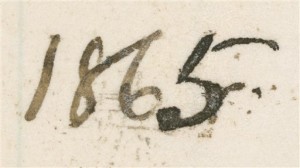Last week a story broke about a researcher who had altered a Lincoln document in the National Archives and somehow managed to avoid detection for more than a decade (See video, New York Times report, and some angry blog posts by Holzer, Simpson and Wittenberg). I’ve met this man (Thomas Lowry) and know his work. In fact, I have used his stuff in my own books and have praised him in at least one review essay. It’s a sad spectacle to be sure, but one that especially unsettles me now as I am about to send out a group of history majors into local archives for a research project involving Civil War-era Carlisle. Do I need to remind them not to steal things or deface documents? Should I warn the librarians? It’s one thing to lecture students about plagiarism, but quite another to try to convey to them the sacred nature of archival collections within the historical profession. Sometimes it feels like we pray not with bibles but with manuscripts. The reading room is our temple. And now there is a story about a new apostate. Of course, there have been many others before Lowry. Just a couple of weeks ago, a former student assistant at the Drew University United Methodist Archives (William Scott) pleaded guilty in US District Court to stealing and selling historic documents while he was an 18-year-old working in the collection. The fact that Tom Lowry could sneak a pen into the National Archives and change the date on a Lincoln pardon from April 14, 1864 to April 14, 1865 (the last day of the president’s life) and that some freshman at Drew could basically have unsupervised reign over thousands of invaluable documents (including Lincoln letters) only underscores the dark, little secret of these historical temples. They may be sacred, but they’re not very secure. Archivists juggle many problems, not the least of which is a perpetual lack of funds. Most of their enforcement mechanism is built upon trust. And while most historians tend not to care so much about money, they also rarely follow rules and they can be careless. I’ve carried pens into reading rooms –by accident. Sometimes I’ve forgotten the required white gloves or jumbled the folders in the manuscript boxes as I rushed off to my next research conquest. So, in the spirit of humility and feeling chastened for my profession, here are my latest tips to my students:
1) When you go to archives, find out the rules for handling materials.
2) Follow those rules.
3) And when you leave, try to remember that you are exiting a place of worship.

